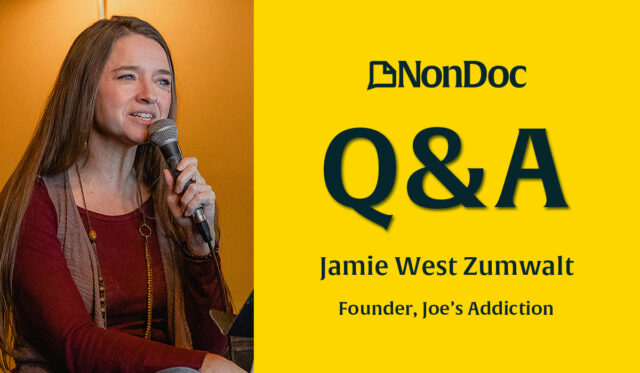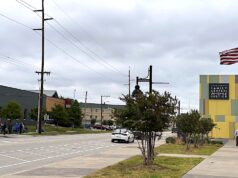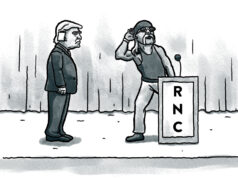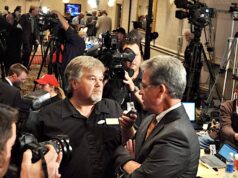

Jamie Zumwalt and her husband opened Joe’s Addiction coffee shop in 2007 to provide a hangout for vulnerable people and those in recovery in and around Valley Brook, a tiny municipality in southeast Oklahoma City notorious for its strip clubs.
Zumwalt envisioned an establishment like the bar in the TV series Cheers, but with a twist. It would welcome people experiencing homelessness, drug addiction, mental illness, past incarceration, gang affiliation and sexual trauma. It would be a self-regulating community “where everyone is a misfit and everyone belongs.”
A former missionary, Zumwalt calls it her “grand experiment,” a chance to put into practice Jesus’s admonitions to demonstrate love and acceptance to “the least of these.”
Seventeen years later, Joe’s Addiction is looking for a new home itself. Besides the original Valley Brook crowd, lower-income people from other parts of Oklahoma City are now arriving on buses to spend the day at Joe’s. Zumwalt wants to find a new location with at least double her current capacity and enough surrounding land to build some housing units.
In this Q&A, Jamie Zumwalt discusses the history of Joe’s Addiction and the evolution of her own thinking about religion, social outreach and intergenerational poverty. The conversation has been edited lightly for clarity and style.
In your 2018 book Beloved Chaos, you said the creation of Joe’s Addiction was the result of a personal spiritual crisis. What shook your faith?
A series of painful life experiences that happened in a short period of time caused me to question the things I had believed. A dear friend, who was serving God in what I believed to be the most important of sacrificial ways, died from pancreatic cancer. A staff member who I believed to be a “super-Christian” cheated on his wife and destroyed his family. And the tightly-knit church I was in blew apart from conflict and an inability to love one another and treat each other with even the most basic kindness. The God that I had understood would protect and heal, make holy, and fill with the fruit of the spirit apparently could not do any of those things.
You described the establishment of Joe’s as a “grand experiment.” Did the experiment succeed?
It has succeeded. The experiment was to see if it is even possible to live the things Jesus taught: loving one another; giving to those who ask of you; giving preference to the poor; not judging; forgiving people who hurt you; giving mercy to “sinners;” welcoming and accepting the outcasts. We have found it is possible to live this way. Not without mistakes, of course, but with humility when we fail.
The second part of the experiment was to find out if it makes a difference if we do live this way — not for someday after people die — but here and now. And it has. We are experiencing a community in which each person belongs and is being loved and cared for by one another. Father Gregory Boyle said, “You stand with the least likely to succeed until success is succeeded by something more valuable: kinship.” This is my measurement of success.
Do you think Jesus’ message has been misinterpreted or mischaracterized by organized religion?
I don’t think Jesus would recognize the evangelical church today. Much of what Jesus taught is dismissed as irrelevant, impractical or unpatriotic by much of the church today. Turn the other cheek? When people steal from you, don’t try to get it back? Love your enemies?
If you suddenly lost your religion, would you still want to run Joe’s?
I have lost my religion. I no longer ascribe to any religious set of beliefs or prescribed practices. I do find deep value in and clear evidence that the teachings and practice of love taught by Jesus and by many other great religious and social leaders throughout history are the only thing that saves us as human beings. Without love — treating one another with kindness, patience, gentleness, goodness, etc. — we are doomed as a species. And so, yes. I keep doing this thing at Joe’s Addiction because I find my highest fulfillment in practicing love and seeing its effects every day.
As you encounter people with chronic problems, some self-inflicted, do you try to change them for the better or simply accept them as they are?
I accept them as they are. As trust and relationship develop, people begin to express their own desire to change. I am happy to offer help and resources when someone comes to this desire within themselves.
Of the many challenges your customers face, which one is the most difficult for you to address?
I would identify it as trauma. On the surface, the challenge may look like criminal behavior or drug addiction or mental illness. But what is underneath all of these is trauma. All of the people who hang out at Joe’s Addiction have experienced trauma, many of them beginning in their young childhoods. The kinds of resources to heal trauma — therapy, personnel, finances — are not available, so we are often treating symptoms without being able to address sources of pain. This is extremely frustrating to me, as I wish we could bring more deep and lasting healing.
If you were a social scientist conducting a research study on Joe’s Addiction, what would you cite as your most important finding?
We have operated for 80 years on Abraham Maslow’s theory of our hierarchy of needs, which places physiological needs at the bottom as most basically necessary, then safety needs at the next level, and then in third place love and belonging. Again and again, I have seen people in our community refuse housing and return to the streets where their physiological and safety needs are not met, in order to stay nearby and connected to our community at Joe’s Addiction. Perhaps our need for love and belonging is really at the bottom of our hierarchy of needs — the foundation of everything being love.
You have said you regard people with mental illness as your favorite friends. What do you see in them that makes you feel that way?
Humans are wired for connection, but my personality seems to be even more so. This is what I hope for, what I aim for. For people who are experiencing mental illness, this can be especially difficult. If the illness is a result of trauma, even more so. So, when I make a connection with someone who is mentally ill, I feel the deepest sense of gratitude that they have allowed me to enter their emotional space.
As is true for all of us, I guess I also have a desire to be seen and known, and I can’t tell you how many times one of my severely mentally ill friends has looked me in the eye — for a brief moment — and said words that went deep into my soul. Perhaps I find the truest kind of love — without any ulterior motives — in these encounters.
You said about 100 homeless people congregate at Joe’s every day. There are an estimated 650,000 homeless people nationwide. Do you feel like you’re just scratching the surface? Does that discourage you?
No. I don’t feel it is my job to solve the problem of homelessness on such a large scale. What does discourage me is that I am unable to provide the physiological and safety needs of even the ones who are hanging out with us in community at Joe’s Addiction. I long to see simple housing that will give them a place to sleep at night, right nearby our community gathering space.
If Joe’s finds a new home, will your mission change or expand in any way?
We do need a larger building for what we are currently doing. We never anticipated so many gathering, and the floor space for physically being in the building is simply not enough. We are dreaming of finding a location that will also allow for building permanent supportive housing where our people can live in proximity with the daily support they need to live comfortable and safe lives.
You said you created your own street gang at Joe’s. Please explain.
We call it the Love Gang. There are more than 50 of us now who have taken a tattoo of a heart. Mine is on my face, under my left eye, where many gang members have a teardrop. Rather than the violence a teardrop represents, the heart represents our commitment to love our enemies. For many, it has become a symbol of being a member of the Joe’s Addiction community.
When you’re feeling weary, what cheers you up? Do you recall an incident at Joe’s that made you laugh?
People at Joe’s usually are what cheer me up. We experience laughter every day. Lots of teasing and banter, inside jokes that friends and family only share.
A man in the neighborhood kept coming into Joe’s with his shirt off. We follow a general policy of keeping our clothes on, so I told him he’d need to put a shirt on. The next day, he came in again with no shirt. Again, I told him. I said, “Jimmy, we don’t want to see your nipples!” He laughed. On the third day, once again he came in without a shirt. I was now annoyed. He walked straight up to the bar to order his coffee, and I was ready to tell him no, when I noticed Band-Aids over both his nipples. He smiled, and told me, “You said you didn’t want to see my nipples.”




















